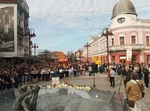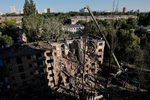US envoys Chollet, Escobar: Dodik, inflammatory rhetoric threaten peace in BiH

The US Senate Foreign Policy Committee heard the reports on the situation in the Western Balkans by the special adviser to the US Secretary of State, Derek Chollet, and Gabriel Escobar, the US special envoy for the Western Balkans, both of whom mentioned the President of Bosnia’s Republika Srpska (RS) entity, Milorad Dodik, and inflammatory rhetoric as some of the main reasons for the country’s instability and lack of democratic progress.
Chollet said that US policy is based on simple principles which they want to see in Europe.
“Our policy is grounded on a simple principle: a whole, free, prosperous and at peace Europe - it is in our national security interest, but unfortunately the Western Balkans remains the missing piece of the puzzle. EU integration has not been easy. The obstacles have been formidable. The corruption, cyber-attacks, economic obstacles, dependence on Russian energy, the list goes on,” he said.
“We are focused on serious challenges in Bosnia and Herzegovina. Twenty-eight years after Dayton there is still peace in BiH but it is a very uneasy peace. Pervasive corruption, democratic backsliding, increasingly inflammatory rhetoric by ethno-nationalist leaders are deeply troubling and attack the foundations of the Dayton Agreement. We have made clear that we oppose such actions and we will impose consequences. We remain deeply committed to BiH’s territorial integrity and sovereignty, its Euro-Atlantic integration and the full implementation of the Dayton," Chollet pointed out.
The US’ Western Balkans Envoy stressed Bosnia’s divisions and political games played in the country.
"In Bosnia and Herzegovina, society is divided, Euro-Atlantic aspirations and the future of citizens are undermined. Ethno-national political leaders from all constituent peoples often pursue political gain rather than the public good. The US is now engaged in an intensive effort to strengthen the international community’s work to uphold the Dayton Peace Agreement," he said.
Escobar noted that the High Representative’s use of the Bonn powers was a difficult but necessary decision.
"The High Representative used the Bonn powers in October 2022 to break a four-year deadlock on FBiH entity Government formation. The US strongly supported these difficult but necessary decisions. With the new state and entity level governments in place, we can help BiH leaders implement long overdue reforms and advance their citizens’ Euro-Atlantic aspirations," the envoy said. "We’re deeply alarmed by Republika Srpska (RS) entity President Milorad Dodik’s persistent secession and anti-democratic actions. In cooperation with European partners, we will work to deter Dodik from pursuing de facto separation and limit resources to fund his divisive practices."
He also added that the US will continue to support the EUFOR ALTEA mission.
"We continue to support a robust EU operation – Operation ALTHEA mission to preserve BiH’s sovereignty, territorial integrity and multi-ethnic character, and the US will continue to deploy sanctions against those throughout the region who threaten or undermine BiH’s institutions or the Dayton Peace Agreement. There are also bright spots in the region, and not coincidentally there are NATO members," Escobar concluded his report on Bosnia.
Kakvo je tvoje mišljenje o ovome?
Učestvuj u diskusiji ili pročitaj komentare





 Srbija
Srbija
 Hrvatska
Hrvatska
 Slovenija
Slovenija



























































